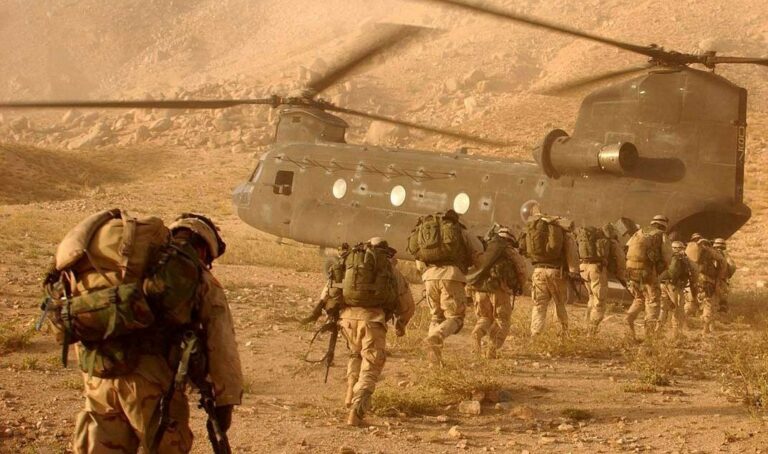The bombing of Syria was a violation of U.S. and International law. It was the U.S. that violated the nuclear deal with Iran and Biden should rejoin the agreement without new conditions. Phyliss Bennis and Larry Wilkerson join Paul Jay on theAnalysis.news
Paul Jay
Hi, welcome to theAnalysis.news. I’m Paul Jay. Please don’t forget the donate button at the top of the webpage.
On February 28th, Iran rejected the U.S. offer to attend a meeting of the P5+1 countries Britain, China, France, Germany, Russia, and the United States to chart a diplomatic way forward on the Iran nuclear deal. Foreign Ministry spokesman Saeed Khatibzadeh said that the Biden administration had not set aside President Donald Trump’s so-called maximum pressure policy, quote, “Given the recent moves and positions of the U.S. and the three European countries, the Islamic Republic doesn’t assess the timing of an informal meeting proposed by the EU coordinator as appropriate.”
Iran’s Foreign Ministry spokesman also said the path ahead is very clear. The U.S. should end its illegal unilateral sanctions and return to the JSCPOA. That’s the Joint Comprehensive Plan of Action commitments. Last week, the U.S. military bombed bases in Syria it claims belong to a pro-Iranian militia. U.S. defense officials announced the strikes without providing details and with no mention of casualties, saying only they were retaliation for a rocket attack in Iraq earlier last month that killed one civilian contractor and wounded a U.S. service member.
The U.S. attack was carried out without a declaration of war or authorization from Congress as Syria had not attacked the United States. The bombing on Syrian territory was also a violation of international law. Now joining us to discuss U.S. policy towards Iran is Phyllis Bennis, who is the director of the New Internationalism Project at the Institute for Policy Studies. Among her latest books are understanding ISIS and the new Global War on Terror, as well as the updated edition of Understanding the Palestinian-Israeli Conflict.
Thanks for joining us, Phyllis.
Phyllis Bennis
Good to be with you, Paul.
Paul Jay
And also joining us again is Lawrence Wilkerson. He’s a retired United States Army colonel and former chief of staff to Secretary of State Colin Powell. Thank you, Larry.
Lawrence Wilkerson
Thanks for having me on the analysis.
Paul Jay
So, Larry, kick us off. First of all, from the legal perspective, was this bombing legal either by U.S. law or international law?
Lawrence Wilkerson
As far as I read it, both in terms of the law of war and international law in general, the U.S. operations in Syria are all violative. That is to say, they are all wrong, they’re illegal. We were not invited into Syria by the existing government. We didn’t have a reason in our own defense, self-defense, if you will, Article 51, for example, to go into Syria. It’s all illegal. Everything we are doing in Syria is illegal.
Now, the administration is arguing that it’s under the AUMF that gave us carte blanche to attack every terrorist on the face of the earth, wherever they might appear in whatever decade or century. And that’s what we’re doing. It’s illegal.
Paul Jay
This is the post 9/11, quote-unquote, authorization.
Lawrence Wilkerson
Yes.
Phyllis Bennis
Phyllis, what’s your take?
Phyllis Bennis
It certainly is illegal. Larry is absolutely right. What we have here was a scenario where the United States decides that an attack on a base inside Iraq, an Iraqi base where there happened to be some U.S. forces, whether or not they were legally there or not is always a question in Iraq, but the U.S. decides that the militia that allegedly carried out that bombing and just 48 hours before the U.S. retaliated, the Pentagon had admitted they don’t know who carried out the attack on the base.
And yet, 48 hours later, the U.S. bombs the base in Syria, saying that it was a base used by the same militia that attacked the base in Iraq to send a message to Iran. Now, how convoluted is that? And then they went further to say, well, we did this in a way that made sure it would not escalate the situation in Syria or Iraq, how you can bomb a base in Syria that was allegedly used sometimes by maybe the same people who carried out an attack against a different base in a different country to send a message to Iran, a third country, and not have that be an escalation of the existing tensions is, of course, nonsensical.
So it’s not only a question of it being illegal, which it is, but it violates the tenets that have been so painfully learned over these last 20 years that every former general and former diplomat, not to mention current peace advocates and advocates of diplomacy all over the world, have been saying, which is there is no military solution to terrorism, period. Full stop. You can play terrorism whack a mole if you want, slap them here and they pop up there and slap them there and they jump up there. It doesn’t work, so you can say that it’s illegal and it is you can say it doesn’t work and it doesn’t. You also have to acknowledge that it’s making everything worse. It makes the situation inside Iraq and inside Syria far more destabilized. And crucially, it makes the reentry into the Iran nuclear deal far more difficult.
Paul Jay
Larry is is it possible that the reason for doing this is to kind of cover the right flank, like, look how tough we are on Iran we’ll bomb them in Syria in order to put the Republican pressure at bay against the agreement. Now we’re so tough for bombing now we can move ahead with the deal on Iran or am I just dreaming here?
Lawrence Wilkerson
You’re thinking like Jake Sullivan and Tony Blinken and a host of other people who are just the return of the returners. This is the same group that’s been there all along. The Hillary Clintons, the Madeleine Albrights, the whomever’s. This is what you do. This is why Barack Obama said there’s a disposition in this town toward war, a bias towards war. That’s why he said that. We’re looking at a situation where nobody’s got any creativity whatsoever. Why would you want to cover your ass against the right-wing that just tried to overwhelm the capital and kill people?
This is crazy. This is insanity. I thought we were going to get a new government. I thought and I voted for Joe Biden for this reason that we were going to get a team that would come in and revamp and revise and they would start most prominently internationally with the JCPOA. They are screwing the pooch before they ever get into meaningful negotiations. This tit for tat stuff, what should they have done? Let’s just examine that if you have a little imagination, they should have done what my God, my president, George W. Bush did when Iran had a terrible earthquake in Bam, centered on Bam, and we sent everything we could send over there in terms of humanitarian assistance.
Well, how did Pompeo leave Iraq? It left it reeling from Covid-19. His sanctions were so draconian, they couldn’t even get protective gear, let alone vaccine, and so forth. If it weren’t for the Chinese and the Russians, they probably wouldn’t have anything. Why didn’t we start this whole process with a this has nothing to do with the JCP.
We’re just being America the way America should be. We are going to dump so much humanitarian assistance on Iran right now that they won’t have any choice but to say, hey, you did something neat. Maybe we can start talking again. That’s imagination. That’s creativity. This administration has none so far.
Paul Jay
Phyllis, when Jake Sullivan was interviewed by Fareed Zakaria, I thought he was saying that the U.S. was going to return to this agreement without conditions, but that doesn’t seem like what’s happening. Where exactly is this?
Phyllis Bennis
I think we don’t know for sure. We’re getting very different signals and the most important signals are the ones that we’ve seen that come out of U.S. bombers and U.S. missiles and U.S. drones. That’s the most important signal that we’re seeing so far. I do think it’s important that we recognize that this administration has been in office for six weeks now. The danger is that there’s this instinct, as Larry was saying, there’s an old quote about the predisposition in Washington for war.
And it may be that that’s what we’re seeing here again. It may be a little bit different, and the reason I say that is because there have been a couple of important appointments indicating that the Biden administration and President Biden himself seem to be willing to spend a certain amount of political capital to put in place some people with some differences. And I’m speaking particularly of Robert Malley, who was appointed to be the special envoy to the JCPOA negotiations. Special envoy to Iran. Rob Malley was part of the Obama administration and part of earlier administrations as well under Clinton, but he has a very different understanding of diplomacy. And in that earlier period, he was not the head of the team.
The head of the team was Wendy Sherman, who is now in the process of being confirmed by the Senate to be the deputy secretary of state. But the head of the team negotiating with Iran will be Robert Malley. Now, that is significant because there was enormous pushback from those who said that Rob Malley is too soft on the Palestinians, that he’s not sufficiently pro-Israel, that he’s too soft on Iran, and what all of that means is he’s a diplomat’s diplomat who understands that diplomacy is about listening to the other side. It’s about acknowledging that both sides have positions they have to deal with, that both sides have political realities as well as strategic considerations. There’s no guarantee here.
Rob Malley is not an independent actor. He’s going to be representing the Biden administration and right now, that’s not looking very good. But I also think that this is a classic failed policy that administrations in this country and too many other countries around the world have used on the eve of negotiations, which is to ramp up the military in the hope of, quote, sending a message. The ridiculousness of it in this case was that there was no knowledge of certainty of who carried out this bombing.
The attack on the original base where there were some U.S. troops. There was no information about what civilians were nearby. We still don’t know for sure how many people may have been killed. We don’t know how close this base that was attacked by the United States actually sits to the host of crowded under I mean, overcapacity and underserved refugee camps throughout that part of Syria. It’s a disastrous area as a result of a long-standing war in Syria that has long ceased to be a civil war and is now a proxy war for a host of both regional and global powers, of which the United States is one.
So this is a very, very dangerous move. It’s an incredibly dangerous move. I think there is still the possibility that negotiations could go forward. There’s always the need to parse the language, saying that from the Iranian foreign minister’s statement that the United States must end the Trump era sanctions. One way to do that would be to announce that the implementation of the sanctions is being suspended. As a first step, I think the Iranians are likely to take that as a first step to which they would answer with another small step, and that’s what diplomacy looks like, small steps by small steps, this notion that the United States thinks it can demand of Iran to make the first move when it was the United States that abandoned the nuclear deal.
The U.S. was a signatory to that deal. It was the United States, not Iran, that walked away from the deal. So the notion that now the U.S. can come back and say, well, we think that the Iranians should blink first, we think they must make the first move. It’s like who said you get to do that? And the question here, frankly, comes back to the Europeans.
If the Europeans stand there, their position and tell the United States in no uncertain terms that they are not prepared to hold Iran accountable for making the first step because it’s the obligation of the United States, which was the problem with the ending of the nuclear deal, then we might still have a chance. We might still have a chance.
Paul Jay
Larry, the U.S. intelligence agencies for quite a while, and I’m not sure they actually ever changed their assessment, was that the Iranians actually didn’t even have a nuclear weapons program. I know a lot of people thought they were getting themselves in a position. I’m sorry go ahead.
Lawrence Wilkerson
I was pretty much privy to what the NIC and others were saying at the time, and I think the message is better stated this way. They probably did have a program to develop a nuclear weapon before 2000, 2001, or 2002, but they made a conscious decision. The leadership made a conscious decision to not continue that program, that it was in Iran’s disinterest ultimately to continue that program. And so from that period, whatever it was, 02, 03, whatever, they have not had a nuclear weapons program. I think that was the finding.
Paul Jay
So the forces that were against this deal, this nuclear deal, nuclear weapons deal, their real concerns seemed to have been the extent of Iranian influence in Iraq, Iranian support for Hezbollah, and maybe most importantly, ballistic missiles, not nuclear, but the ability of Iran to have ballistic missiles, which gives them enormous…
Lawrence Wilkerson
Really the only thing it has to defend itself with because we’ve taken its armed forces, its airplanes, and other things and sanctioned them so harshly that they can’t even get repair parts. In fact they can’t get repair parts for some of their civilian airplanes. So their real bastion if you will, their self-defense capability, is their missile force.
Paul Jay
And that’s what the people that don’t want this deal to go ahead, they want them to make use of the covid crisis, the sanctions, to try to push this into something that deals with Iran’s right to have ballistic missiles, and it’s got to be defensive. I mean, as an offensive weapon, these ballistic missiles are useless because they would just make in Iran a target for everything the United States has to throw at them. It could only be defensive.
Lawrence Wilkerson
Everything Israel and Saudi Arabia have to throw at them, too, the GCC in general. Let me just Phyllis has got a very powerful point here. It’s legit. It’s absolutely the case.
Doesn’t matter who’s president of the United States. Iran doesn’t care that we switch from Trump to Biden or Biden to Trump or whatever. The president of the United States sets policy for the United States, however bad that policy might be. And you have to live with that. The other country has to live with that, too, but they don’t have to take it in the throat, and Iran’s not going to. So we should have been front-leaning on this. There are too many problems already.
We’ve got the new actions Iran has taken since our illegal withdrawal from the JCPPOA. We’ve got the IAEA contribution controversy, IAEA controversy over its documents. We’ve got post-2018 actions by Iran. Post our pulling out of the agreement actions by Iran. We’ve got the sunsets that are more imminent, one of them in 2023. The Congress has to approve the lifting of the nuclear sanctions.
We’ve got regional powers that want to participate. There are all kinds of difficulties and challenges right now. We don’t need to be creating any new ones. This is going to be extremely complex and difficult just to do given those challenges. We don’t need to create anything new. We don’t need leverage. The United States doesn’t need leverage against Iran.
Oh, let’s go hit them. Let’s hit. This is nonsense. It’s just sheer nonsense. It shows that there is no imagination in Washington’s leadership. I hope I’m wrong. I hope when Malley comes in, I hope when Wendy Sherman gets approved and so forth, I hope there becomes some creativity and imagination or at least some real diplomacy, but I don’t see it so far. I’ve got my fingers crossed. I’m still hoping I haven’t given up yet, but I’m worried.
Phyllis Bennis
I think we all should be very worried and the pressure needs to remain very strong to give any chance to real diplomacy here. I do think we need to come back to what are the real stakes here, and I think that while it’s true that you can look at Iran’s missile program, its defensive missiles, it’s true. That’s all they’ve got, et cetera, but I also think it’s a mistake to say that’s what they the people who in this country who are opposed to the diplomacy, to the diplomatic approach.
That’s really not the problem. There’s an illusion that Iran somehow represents an existential threat, certainly to Israel, maybe to the whole region, and maybe to the whole world. There’s this constant repetition of the false claim that Iran is the worst perpetrator of state-sponsored terrorism against individuals. It’s simply not the case. If you look at numbers of cases by any rational examination, that simply doesn’t hold up. If Iran were to reverse its current position, the position it’s held, as Larry said, since 2003, something acknowledged by all 16 of the U.S. intelligence agencies that Iran doesn’t have a nuclear weapon, isn’t building a nuclear weapon and hasn’t even decided it wants a nuclear weapon, and the supreme leader in Iran has said that it would be a violation of Islamic law to have such a weapon. And we can say, well, that’s kind of ridiculous, but in the Iranian context, that is not ridiculous at all. Once something is deemed to have a religious significance, either positive or negative, that’s a very hard thing to reverse in Iranian society. So that’s very important.
So if you put aside all of that and say Iran was going to have a nuclear weapon, even then, it would not be an existential threat to Israel. Israel is the one country in the region, not Iran, that has an actual nuclear weapons arsenal, and what Iran would threaten would be the nuclear monopoly of Israel, not the existence of Israel.
That’s not how it works in the real world. So it’s all of these things are exaggerated, are created whole cloth in some cases, because what we see in the region is a set of regional competitions for who’s going to be the regional dominant hegemon, if you will, in the Middle East region and that largely has come down in recent years to the fight for influence between Saudi Arabia and Iran and if you look back historically earlier than that, 20, 30, 40 years ago, you can see that in the Middle East, there were only two countries that had the capacity to be indigenous regional powers in that way.
Iran and Iraq, meaning they had size of land and population. They had wealth from oil and they had water. Only those two countries had all three. The U.S. goes in and destroys Iraq through a dozen years of crippling sanctions and then takes out its leadership, destroys its military, and leaves the country shredded and then you have Iran, which is no great friend of the United States, and vice versa since the Iranian revolution of 1979, although if you ask Iraqis it goes back to 1953 when the U.S. and the Brits orchestrated a coup to overthrow the legitimately elected government in Iran and imposed the Shah of Iran who later was overthrown in the revolution.
If you look at all of that, what you’re looking at is a very classic fight for regional power and the U.S. has picked its side. It’s picked its side and its side is Israel, Saudi Arabia, and the UAE, and some other Arab countries, but basically, those three leading an anti-Iran coalition. The four years of the Trump administration were four years of building this anti-Iran coalition whose key weapon was the imposition of these absolutely crippling sanctions. The only reason they were not as lethal as the sanctions for 12 years in Iraq was that the country of Iran had not yet been destroyed by the United States and it was a wealthy country.
So it was somewhat better able to handle the impact, but you now have in Iran people dying because they can’t get cancer medications, people dying because the hospitals can’t get the equipment they need because of sanctions, and children dying of malnutrition, which is unheard of in contemporary modern Iranian history. That’s on us. That’s on these sanctions, and for all the people here want to say, well, that was the Trump sanctions, this is over now. First of all, it’s not over.
They have not been ended, let alone the nuclear sanctions. These new sanctions are still in place. And number two, what Larry said is crucial here. These are American sanctions. They’re not Trump sanctions versus Obama sanctions versus Bush sanctions versus Biden sanctions. These are American sanctions, and the Iranians, understandably, are treating them as such. So the first thing you have to do is stop the violations of the nuclear deal that we have imposed. Then you can ask Iran to stop violating the terms that it said very carefully in a very calibrated way.
We’re going to start violating these agreements because there is no longer a viable agreement because the U.S. pulled out. That’s where we have to start.
Paul Jay
Larry, are these people still dreaming of regime change?
Lawrence Wilkerson
Some of them are. I’m quite sure of that. There are people outside the administration in particular that are and they have influence with certain other people who are in the administration. Phyllis made a good point there that we forget.
I can’t tell you the last time I heard a principal in the United States government make this point, except in private and very seldom even then, Israel has more than two hundred nuclear weapons. We know that for a fact. I think it’s higher than that. I think it’s more towards three hundred. Israel is going to have Netanyahu and the right-wing government are going to have some problem keeping this issue hot in the way they want to keep it because they’re renovating Dimona over the next few months.
That’s their nuclear complex. The idea that anyone in Iran would be so megalomaniacal as to send a nuclear weapon or missile of any sort toward Israel, knowing that they would disappear from the face of the earth within literally half hour-hour to that missiles impacting or even it being in flight is sheer nonsense.
So Israel and Iran are in even if Iran had a nuclear weapon now, even if it developed one or 10 or 40, they’re in a situation of stasis. They are deterred because they’re not irrational actors. That’s lost. That’s completely lost.
Now, that doesn’t mean I want Iran to have a nuclear weapon because then the Saudis will want and they’ll run out and buy one from the Pakistanis who will sell it to them willingly overnight, probably 30, and you will be off to a nuclear arms race. That’s the last thing we need, but this has to be understood and it’s just completely overlooked by everyone because they don’t want anybody talking about. They don’t want common sense. They don’t want rationality to intervene here because oh those theocrats are irrational. Bull.
Paul Jay
Phyllis, what’s been the response from the progressive wing of the Democratic Party, are they speaking out on both the bombing in Syria and on the issue of the agreement?
Phyllis Bennis
They have been a number of members of Congress have issued very strong statements, but what we haven’t seen yet is a move in Congress. There is now a move by Senator Kaine and someone else I’m forgetting who the second was. On a bipartisan basis, a move in the Senate to repeal two Authorizations for the Use of Military Force, but oddly, while one is the 2002 Authorization for the Iraq war, the other is not the 2001 Authorization for the War in Afghanistan, which is the one that has been used massively in expanding the global war on terror.
Instead, they’re calling for the repeal of the 1991 Authorization for the original use of military force against Iraq after Iraq invaded Kuwait in 1990, which was used several times inside Iraq by Clinton, in particular, to justify the creation unilaterally, although he lied and said that it was done by the UN, it was not one was the other was not.
Lawrence Wilkerson
It was also the justification for the British, the French, French dropped off and us to do the no-fly zone.
Phyllis Bennis
Well, we did one no-fly zone. The U.N. did one, but the U.S. did the bombing of the no-fly zones where over 700 people were killed over the years in bombings of the so-called no-fly zones. It was only a no-fly for the Iraqi side. The U.S. could fly all it wanted and it did and it bombed and it killed people, including civilians, but it was that authorization that they’re calling for being repealed and not for reasons that I absolutely do not understand.
They’re not including the crucial authorization, what Barbara Lee has stood for all these years as the one member of Congress who voted no, the only one two days after the attacks of 9/11, she was the only one who voted against authorizing for the use of military force, and in her speech that day, she said this will be used far beyond what we intended to be used here today, and boy, was she prescient. Boy, was she right.
And that’s what we’re dealing with at the moment. So there have been some important statements, Ro Khanna, Barbara Lee, others have made very important statements, the Progressive Caucus, but we have not seen a move in Congress to head this off, to say that we will cut funds, for instance, to any military use that is aimed at Iran in this period of the run-up to the reopening of negotiations for the JCPOA. We have not yet seen that.
Lawrence Wilkerson
Mhm. My dealings on the Yemen conflict with Kaine, Menendez, Pelosi, Hoyer, Mike Lee and others really opened my eyes to the lack of a desire to do anything about the president’s ability to use the war power without almost any restraint from the legislative branch. They just are a bunch of cowards. They just don’t want to do it.
Paul Jay
All right. Thank you both for joining me.
Phyllis Bennis
Thank you, Paul.
Lawrence Wilkerson
Thanks for having me..
Paul Jay
And thank you for joining us on theAnalysis.news. Please don’t forget there’s a donate button at the top of the webpage.







Please try to get names presented correctly. Phyllis Bennis appears to be the correct spelling. This is only a suggestion, not being glib, certainly not a complaint. Wonderful, wonderful discussion! As always.
Nuclear weapons are not just expensive to build, they are even more expensive to maintain. It’s one of the reasons the China, the most rational actors in the nuclear club, have not seen any need to build any more of them than Israel has, around 300. Israel has built so many of these weapons because corruption. If the USA was not supplying Israel with so much wealth to plunder, Israel would have to shrink its program. The biggest threat to world peace is the corruption endemic to the USA empire.